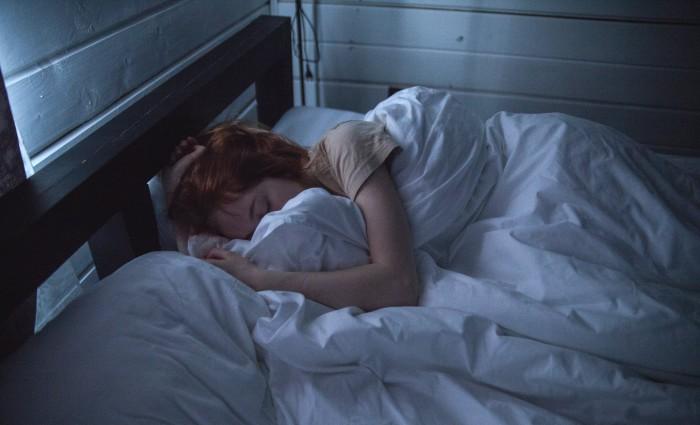Many people listen to music throughout the day and often relax by listening to music near bedtime. But will this actually cause your sleep to be affected? When sleep researcher Michael Scullin, Ph.D., an associate professor of psychology and neuroscience at Baylor University, recently investigated the relationship between listening to music and sleep, it focused on a mechanism that is rarely explored: involuntary musical imagination, or "ear bugs," when a song or piece is repeated repeated in a person's mind. This usually happens when awake, but Scullin found that they can also occur when trying to sleep.

Scullin's recent research was published in the journal Psychological Science.
Scullin said: "Even without music, our brains continue to process music, including when we are obviously asleep. Everyone knows that listening to music feels good. Teens and young adults often listen to music as they approach bedtime. But sometimes you may have too many good things. The more music you listen to, the more likely you are to catch 'ear worms' that don't go away before bedtime. When this happens, your sleep may be affected. ”
Compared to people who rarely experience "earworms", people who often experience "earworms" at night (one or more times a week) – six times more likely to have poor sleep quality. Surprisingly, the study found that some instrumental music is more likely than lyrical music to cause "earworms" and disrupt sleep quality.
The study involved a survey and a laboratory experiment. The survey involved 209 participants who completed a series of surveys on sleep quality, listening habits and frequency of "earworms," including how often they encountered "earworms" when they tried to fall asleep, when they woke up in the middle of the night, and when they woke up in the morning.
In the experimental study, 50 participants were taken to Baylor University's Scullin Sleep Neuroscience and Cognitive Laboratory, where the team tried to induce "earworms" to determine how it affects sleep quality. Polysomnography — a comprehensive test and gold standard measure of sleep — was used to record participants' brain waves, heart rate, breathing, and more while asleep.
"Before bedtime, we played three popular, catchy songs — 'Shake It Off' by Taylor Swift, 'Call Me Maybe' by Carly Ray Gipson and 'Don't Stop Believin' by Journey," Scullin said. "We randomly assigned participants to listen to the original versions of these songs or the deoplated versions of these songs. Participants answered if and when they had experienced earworms. We then analyzed whether this affected their sleep physiology at night. People who experience earworms have more difficulty falling asleep, wake up more often at night, and spend more time during the light sleep phase. ”
In addition, the scientists quantified the EEG readings in the experimental study — the recording of electrical activity in the brain — to examine physiological markers for sleep-dependent memory consolidation. Memory consolidation is the process by which temporary memories spontaneously reactivate during sleep and transform into longer-term forms.
"We thought people would have earworms when they tried to fall asleep before bed, but we certainly didn't know that people would report being woken up by earworms from sleep on a regular basis. But we've seen it both in surveys and experimental studies," he said.
Participants with sleep "earworms" showed more slow oscillations during sleep, a sign of memory reactivation. An increase in slow oscillations dominates the region corresponding to the primary auditory cortex, which involves "earworm" treatment when people are awake.
Scullin said: "Almost everyone thought that music would improve their sleep, but we found that those who listened to more music slept worse. What's really surprising is that instrumental music leads to worse sleep quality — instrumental music causes about twice as many earworms. ”
The study found that people with more listening habits experienced persistent "earworms" and a decline in sleep quality. These results are contrary to the idea of music as a hypnotic agent that may aid sleep. Healthy organizations often recommend listening to quiet music before bedtime — and these recommendations come primarily from self-reported studies. Instead, Scullin has objectively measured how many hours the sleeping brain continues to process music, even after the music has stopped.
Knowing that "ear worms" have a negative impact on sleep, Scullin recommends first trying to listen to music in moderation, or taking an occasional break when plagued by "ear worms." The timing of music is also important – try to avoid listening to music before bedtime.
"If you listen to music in bed a lot, then you make the association that in this case, even if you don't listen to music, you may trigger ear worms, such as when you're trying to fall asleep," he said. ”
Another way to get rid of "earworms" is to engage in cognitive activity — focusing entirely on a task, problem, or activity can help distract your brain from the "earworms." A previous Scullin study — funded in part by a Grant from the National Institutes of Health and the Sleep Research Society Foundation — found that participants spending 5 minutes before bed writing down upcoming tasks helped shed worries about the future and led to faster sleep.